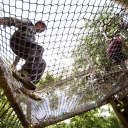


Why playtime is an essential part of childhood development
Children’s lives are overscheduled now more than ever before and all those activities are taking a bite out of their free playtime. By shortchanging playtime, children miss out on emotional, social, physical, and cognitive benefits. In some...Read more
No child’s play for Hong Kong kindergartens to fit in sufficient exercise time
Report says 99 per cent which took part in study did not allocate enough playtime for schoolchildren, which can be detrimental to their reflexes in the long run. A study has found that less than 1...Read more
Play through the eyes of a child – Part two
As discussed in part 1, children’s play is an instinctive and natural phenomenon. As such, it has vast, many-varied possible manifestations. Yet what does this actually mean? From birth, a baby wants to interact: initially with...Read more

